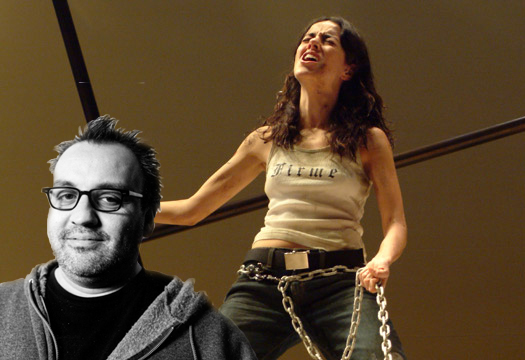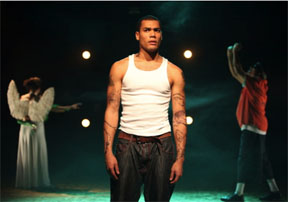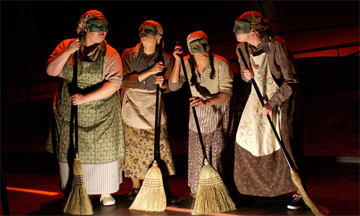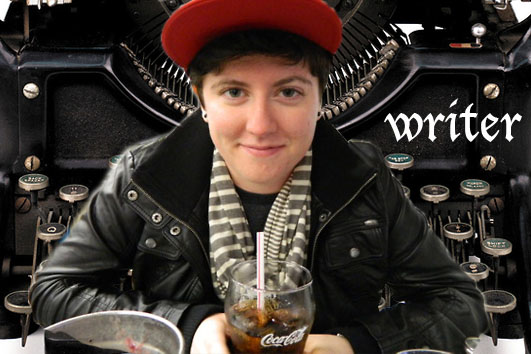Luis Alfaro
- Luis Alfaro
- Luis's Work
- Contributor Meghan Nelson

Luis Alfaro is a Chicano playwright, poet, performer, and activist based in Los Angeles. He is an assistant professor at USC in the theater department. He has a vast number of plays and performances that have been performed in Los Angeles and surrounding areas as well as in other cities such as Chicago and Washington D.C. Some of his works are Electricidad, Body of Faith, and Bitter Homes and Gardens. He has also received numerous awards and honors. Alfaro is also the only artist to ever receive two grants in one year from the Fund for New American Plays, run by the Kennedy Center.
Alfaro's plays are often modern retellings of the classic Greek tragedies, such as Oedipus Rex, Electra, and Medea. He calls them "an accident that fell into (his) lap." His main goal with the plays was to translate the classic plays for his community because he could see himself and parts of his life within the morals of the stories. He works very hard to adapt the stories so that the modern audience will be able to connect with them. One of the things he says he likes to do is flesh out the backstories of the characters within the play, which gives him more freedom to add cultural specifics while maintaining the plays' original structures.
In 2012 Luis Alfaro won the Joyce Award, which is a grant of $50,000 awarded to artists of color. The article announcing his award stated he would be "working with Enrique Adyanthaya and Marlina Gonzalez, Alfaro will write a season of plays based on the ideas behind the fusion of Latino and Asian cultures, that will be created in collaboration with two Minneapolis/St. Paul theater companies, Teatro del Pueblo and Pangea. The plays will range from love stories of interracial couples exploring tensions between their two communities to a children's story adapted from a fable."
Sources:
“Orphan of Aztlán”
past the reruns ése
and riding the big wave
called future
making myself
fabulous
as I disentangle
from the wreck of this
cultural collision
I am a Queer Chicano
A native in no land
An orphan of Atzlan
The Pocho son of farm worker parents
The Mexicans only want me
when I talk about Mexico
But what about
Mexican Queers in L.A.?
The Queers only want me,
when they need
to add color
add spice
like salsa picante,
on the side
With one foot on
each side of the border,
not the border between
México and the United States,
but the border between
Chicano and Queer,
I search for a
home in both
yet neither one
believes that
I exist
Blur the line
take the journey
play with the unknown
deal with the whole enchilada
We will continue
to create these
espectáculos tan sabrosos
that we can call our Queer Latino selves
and we will make them
al estilo los
like only we know
how to make them
Because we are
at the edge
at the rim
at the border
of a new world
and there is no place
to run
or hide
So tonight
I walk down
to the corner
I step over
this burned out lot
and say
I come in the name of peace and justice
and I ask
What are you afraid of?
Are you a
friend
or a
phobe?
“Orphan of Aztlán” is a poem by Luis Alfaro, included in a couple of his bodies of work, such as Cuerpo Politizado and Downtown. In the poem Alfaro discusses his life as a Queer Chicano and how he must navigate his intersecting identities. The video is from an episode of The United States of Poetry entitled “The American Dream.” Alfaro is only one artist who “a proponent of a queer Aztlán”; others include Gil Cuadros and Cherrie Moraga. The artists newly envision the legendary land as a place they can exist where their intersecting identities do not constantly contradict each other and make their existence so difficult. Alfaro takes on the idea of going against “the mold” that he still keeps with in hopes of finding acceptance from his family and fellow Chicanos. He speaks of his constant traveling from one space to another because he has no home in any one location for any period of time. There exists no stasis in his identities, which causes him to travel constantly in order to compete with the varying expectations of his multiple identities. That necessary movement is what takes away anything that can tangibly embody home and thus makes him an orphan of sorts.
Sources:
Literature and Racial Ambiguity
Oedipus El Rey

Oedipus El Rey is a modern re-imagining/retelling of the Athenian tragedy Oedipus Rex. The play is set in modern-day Los Angeles. The main character is a "Chicano ex-con" who wants to become "king of the South Central LA gangland” and the complicated (and sometimes unknown) family relationships of the characters. Alfaro says the play, while it deals with the search for a kingdom (or community), also tries to deal with how people (particularly young Latino men) can escape community that they may find restrictive. Alfaro, in interviews about this and other plays he has written speaks of his desire to bring the Ancient Greek stories to another generation and to translate the story into a more modern setting that a wider range of people (“troubled teens, ex-offenders, members of disadvantaged minorities”) can connect with. The play is staged plainly, with few props and no backdrop save for some very sparse decorations, including the word “Rey.” Alfaro stated that he uses the Greek plays as the basis because he had been told time and again that “muscular plotting” was not his strength. He used the plays because they offered the structure he needed in order to create a story through adaptation, which seems to be working as he has received a good deal of critical success with this play and his other works so-adapted from the Greeks.
Sources:
Electricidad

Alfaro’s Electricidad is another play adapted from the works of an ancient Greek, this times Sophocles and his play Electra. But the great part about Alfaro’s plays is that a viewer does not need to know the story on which it is based to fully appreciate the adaptation. Electricidad takes place in the barrio of East Los Angeles and Alfaro captures the atmosphere of the area perfectly, from the language (more Spanglish than Spanish) to the people who reside there. One reviewer says that while Sophocles’ original story offers structure, Alfaro gives it “substance” through the pace and spirit of the people he portrays in his script. The main theme of the play is vengeance, in which Electricidad is enraged and looks to avenge the death of her father, the king of the East Side Locos. But she is torn between the desires for revenge and redemption. The traditional part of the chorus is filled by the gossiping neighbors, as pictured above, who fill in background information and make connections between the setting of the play and society at large. The staging of the play is minimalistic, much like Oedipus El Rey but with more props and scenery. In at least one production (as staging and scenery are often left to the director) the stage had two palm trees, some timber to symbolize a house, and little else. But just as Sophocles’ original offers structure, Alfaro’s words make a minimalist staging all the more appropriate so as not to distract from his art.
Sources:

I am a third year student at UCLA. I am studying English and LGBT Studies. This year will be my last at UCLA. I will take part in commencement in June and finish up my graduation requirements in the summer. After graduation I do not plan on attending graduate school but rather intend to find a job in publishing or as an administrative assistant position. I have over five years of experience working in a supportive position in an administrative environment and I hope that will help me find employment. I currently work as an administrative assistant at the David Geffen Medical School.
I may back to Massachusetts after I have completed my education because I am originally from there, but I think the more likely outcome is that I will move wherever I can find a job. While I do intend to find a job and work however I can, I also want to complete my first novel or collection of short stories within the next year. I decided to take this class because I consider myself a queer artist in Los Angeles and my writing centers on my experience in Los Angeles over the last three years.


